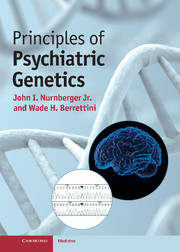Book contents
- Principles of Psychiatric Genetics
- Principles of Psychiatric Genetics
- Copyright page
- Contents
- Contributors
- Preface
- Chapter 1 Contribution of genetic epidemiology to our understanding of psychiatric disorders
- Chapter 2 A basic overview of contemporary human genetic analysis strategies
- Chapter 3 DNA methods
- Chapter 4 In silicoanalysis strategies and resources for psychiatric genetics research
- Chapter 5 Gene expression studies in psychiatric disorders
- Chapter 6 Pharmacogenetics in psychiatry
- Chapter 7 Functional validation of candidate genetic susceptibility factors for major mental illnesses
- Chapter 8 Epigeneticmechanisms in drug addiction and depression
- Chapter 9 Panicdisorder
- Chapter 10 The genetics of the phobic disorders and generalized anxiety disorder
- Chapter 11 Genetic contributions to obsessive–compulsive disorder (OCD) and OCD-related disorders
- Chapter 12 Post-traumaticstress disorder
- Chapter 13 Antisocialbehavior: gene–environment interplay
- Chapter 14 Learning disabilities
- Chapter 15 Attention-deficit hyperactivity disorder
- Chapter 16 Autism and autism spectrum disorders
- Chapter 17 The genetics of bipolar disorder
- Chapter 18 Thegenetics of major depression
- Chapter 19 The genetics of schizophrenia
- Chapter 20 The genetics of anorexia and bulimia nervosa
- Chapter 21 Genetics and common human obesity
- Chapter 22 Alcoholism
- Chapter 23 Nicotine dependence
- Chapter 24 Human molecular genetics of opioid addiction
- Chapter 25 Genetics of stimulant dependence
- Chapter 26 Genetics of personality disorders
- Chapter 27 Ethical issues in behavioral genetics
- Chapter 28 Genetics of Tourette syndrome and related disorders
- Chapter 29 Endophenotypes in psychiatric genetics
- Chapter 30 Developmental disorders
- Chapter 31 Alzheimer's disease
- Index
Chapter 2 - A basic overview of contemporary human genetic analysis strategies
Published online by Cambridge University Press: 05 October 2012
- Principles of Psychiatric Genetics
- Principles of Psychiatric Genetics
- Copyright page
- Contents
- Contributors
- Preface
- Chapter 1 Contribution of genetic epidemiology to our understanding of psychiatric disorders
- Chapter 2 A basic overview of contemporary human genetic analysis strategies
- Chapter 3 DNA methods
- Chapter 4 In silicoanalysis strategies and resources for psychiatric genetics research
- Chapter 5 Gene expression studies in psychiatric disorders
- Chapter 6 Pharmacogenetics in psychiatry
- Chapter 7 Functional validation of candidate genetic susceptibility factors for major mental illnesses
- Chapter 8 Epigeneticmechanisms in drug addiction and depression
- Chapter 9 Panicdisorder
- Chapter 10 The genetics of the phobic disorders and generalized anxiety disorder
- Chapter 11 Genetic contributions to obsessive–compulsive disorder (OCD) and OCD-related disorders
- Chapter 12 Post-traumaticstress disorder
- Chapter 13 Antisocialbehavior: gene–environment interplay
- Chapter 14 Learning disabilities
- Chapter 15 Attention-deficit hyperactivity disorder
- Chapter 16 Autism and autism spectrum disorders
- Chapter 17 The genetics of bipolar disorder
- Chapter 18 Thegenetics of major depression
- Chapter 19 The genetics of schizophrenia
- Chapter 20 The genetics of anorexia and bulimia nervosa
- Chapter 21 Genetics and common human obesity
- Chapter 22 Alcoholism
- Chapter 23 Nicotine dependence
- Chapter 24 Human molecular genetics of opioid addiction
- Chapter 25 Genetics of stimulant dependence
- Chapter 26 Genetics of personality disorders
- Chapter 27 Ethical issues in behavioral genetics
- Chapter 28 Genetics of Tourette syndrome and related disorders
- Chapter 29 Endophenotypes in psychiatric genetics
- Chapter 30 Developmental disorders
- Chapter 31 Alzheimer's disease
- Index
Summary
Human genetics research has received considerable recent attention as a result of major developments in molecular genetic technologies, large-scale coordinated research initiatives such as the Human Genome Project and the International HapMap Project, and major discoveries concerning the genetic basis of disease. The strategies that human geneticists exploit to identify DNA sequence variations that influence disease susceptibility leverage an understanding of the behavior of sequence variations when transmitted from parents to offspring across generations either within a specific family, among a set of families, or in the population at large. In this brief review we describe the basic principles behind the most widely used human genetic strategies to identify inherited disease susceptibility factors. We also point out the limitations and issues that plague these strategies as well as areas for further study.
- Type
- Chapter
- Information
- Principles of Psychiatric Genetics , pp. 13 - 22Publisher: Cambridge University PressPrint publication year: 2012

